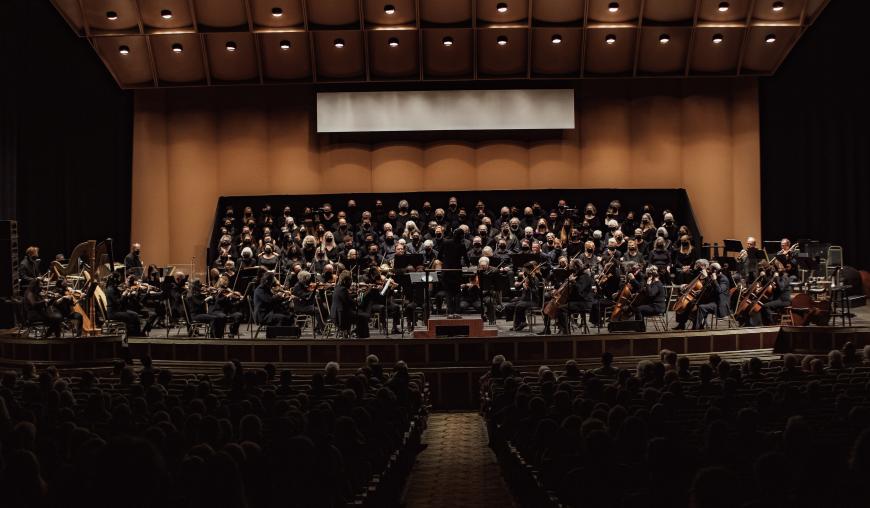
The Oakland Symphony has never let its under-$3-million budget cramp its thinking. It’s still an orchestra on a social equity mission, which you could see from the highly diverse audience at Friday night’s concert at the Paramount Theatre and from the title of the concert itself: “Truth to Power.”
Since the orchestra is still in search mode for a new music director, critical eyes were cast upon the evening’s conductor, Jeri Lynne Johnson. She has an impressive resume, giving well-received guest appearances, founding the Black Pearl Chamber Orchestra, and winning the Taki Alsop Conducting Fellowship in 2005. She’s a direct presence on the podium, all business and no extra movements. She had the orchestra’s attention, leading a crisp reading of Beethoven’s Fidelio Overture to start. And she was more impressive leading Anthony Davis’s clarinet concerto You Have the Right to Remain Silent. I’d give her high marks for her conducting work.
You might not expect a high-powered soloist like Anthony McGill — 2024 Grammy nominee, a performer at former President Barack Obama’s first inaugural, principal of the New York Philharmonic — to sit in with the Oakland Symphony. That is, you wouldn’t expect it if you don’t follow the orchestra or McGill. Since learning this piece for a performance with the Cincinnati Symphony (available on YouTube), he’s made it his own cause and played it in Boston, Detroit, New York, Miami, and finally here. He’s also done a couple of interviews about it.
The concerto’s subject — incarceration and racial profiling — clearly hits home for the clarinetist, as it does for the composer, but the piece is genuinely moving because its emotional journey catalyzes a parallel hegira into the wellsprings of the composer’s imagination. There’s a lot of room for Davis’s trademark melange of influences that reflect parallel musical histories. The biting, modernist first movement, named “Interrogation,” features the soloist in a sharply descending phrase as a solo trombone barks aggressively and other wind interruptions follow. With the clarinetist almost stuttering in shock, the orchestra members speak the first line of the Miranda warning.
But of course, because it’s a clarinet concerto, there’s a lyrical development of the opening ideas that spread out into introspection. And while the drum set, among other instruments, and the repeated warning “you have the right to remain silent” break into this attempt at reverie, the lyricism sets up the second movement, “Loss,” in which Earl Howard, on the Kurzweil synthesizer, live-processes McGill’s lines, played on the strange-sounding contra-alto clarinet. It all leads to an imaginative but scarily violent climax, silence, and then, unexpectedly, a bluesy, mournful Duke Ellington-inspired melody.
The third movement, “Incarceration,” sounds like a scherzo, but the tricky short phrases are phased through rhythms of the Miranda warning, and that leads to a more relaxed finale, the “Dance of the Other,” that is like a reflection on the experience from some distance. Jazz licks and improvisation blend into the piece, leavening an extraordinary 28 minutes of music.

I wish there had been time to hear more than just a few of Margaret Bonds’s Montgomery Variations (1963), a tribute to Martin Luther King Jr. that is based on the spiritual “I Want Jesus to Walk With Me.” Every Bonds piece I’ve heard so far is assured, personal, and technically superb. The Oakland Symphony played it with all the spirit and sumptuousness the orchestra could muster.
But the crowded program moved along to Igor Stravinsky’s Symphony of Psalms, which the orchestra (sans violins) handled capably. The Oakland Symphony Chorus was a bit of a letdown, with many patches of rough blend and indifferent sound. Thank goodness Chorus Director Ash Walker was there to sing with the group. He made a difference, and his easily audible voice kept everyone together through Stravinsky’s often difficult-to-time entrances. Overall, the Symphony of Psalms performance was fine, but it would have been fantastic to end with a full performance of the Montgomery Variations.




